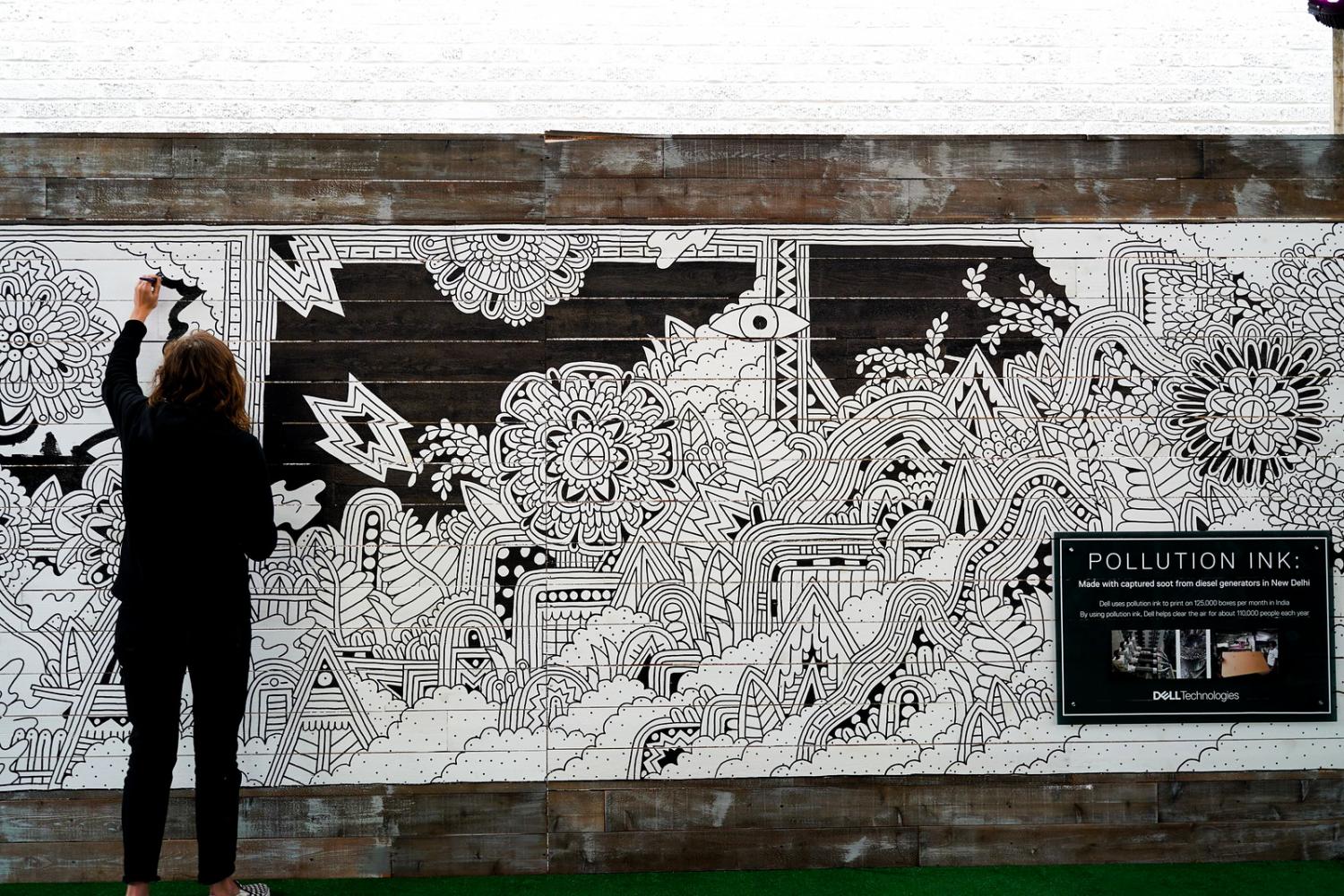
Dell is working on many circular economy projects, including “pollution ink,” made from diesel generator soot - and then used on the packaging in India.
Editor's Note: This story is part of an editorial series featuring companies on CR Magazine's 20th annual 100 Best Corporate Citizens ranking, which recognizes outstanding environmental, social, and governance (ESG) disclosure and performance among the Russell 1,000 Index. You can follow the series here.
The circular economy is maturing, and companies no longer have to reinvent the wheel to take on every new supply chain challenge. They can close the loop by tapping into a rich pool of experienced partners in the business and nonprofit communities.
That strategy has paid off for Dell Technologies. Last month, the company announced that it is ahead of schedule on two key commitments for recycling electronics and using recycled materials. Dell has also introduced several innovative new loop-closing measures with the help of expert partners.
The importance of raised expectations
David Lear, vice president of corporate sustainability at Dell Technologies, draws a close connection between a company’s bottom-line interests and the competitive forces that drive the circular economy. As much as Dell presses its supply chain for improvements, many of the company’s clients and prospective clients are also setting a high bar.
“We are seeing financial benefits from our closed-loop plastics—saving us $2.1 million since the launch in 2014—with more than 70 percent of our customer RFPs asking about Dell Technologies’ responsible business practices,” Lear explains.
Supply chain issues are becoming more important than ever. Leading companies like Dell are moving beyond conventional reporting indexes designed for business. They are also seeking global impact by assimilating the 2015 U.N. Sustainable Development Goals (SDGs), which were created as guideposts for national policy makers.
Partnering for visibility
In the circular economy, recycling is more than just a feel-good message. It is a bottom-line matter of supply chain reliability and resilience. Companies that seek to stand out in the circular economy face a critical obstacle: how to cut through the clutter and get the recycling message out.
To stand out, Dell has gone beyond website content and social media to engage with partners who stand out, too. For example, in 2018, Dell partnered with actress, entrepreneur and activist Nikki Reed to launch the Circular Collection by Bayou with Love, a jewelry collection sourced with gold recovered gold from Dell’s recycling programs.
Dell also sponsored the 2019 Circular Economy People’s Choice Award for the World Economic Forum, featuring “impact drivers” including sustainable tableware, clothing recycling, waste reduction and rainwater harvesting.
The company Triciclos, headquartered in Brazil and Chile, ultimately won top honors for a scalable waste management and recovery model. In addition, this year Dell was also the official technology sponsor and sustainability partner for the 2019 Sundance Film Festival.
Partnering for innovation
Dell also stands out from the crowd by integrating a partner-based strategy into its supply chain. “Much of our inspiration stems from partnership across organizations,” Lear says. “No one organization can deliver such ambitious goals, and we owe our achievement to multiple stakeholders.”
Lear cites one standout example, a partnership with Chakr Innovation for “pollution ink” used on Dell packaging in India. The ink is made from soot captured from diesel generators. The soot capture system also doubles as an air purifier. According to Chakra, it cleans the equivalent of air breathed by 110,000 people.
Other examples include a new partnership with Seagate and Teleplan for recovering rare earth magnets from the Dell Latitude 5000 series, and participation in the NextWave consortium organized by Lonely Whale for ocean plastic and “ghost” fishing gear. (Lonely Whale is also involved with Bacardi for ocean plastic and the sports and entertainment company AEG.)
Dell’s “EcoLoop” initiative has also given rise to innovations like a coating made from used auto glass, and an energy efficient dying process that generates up to 90 percent less wastewater, while also reducing CO2 emissions.
Nudging government policy in the circular direction
NextWave is also supported by U.N. Environment, and that underscores another aspect of Dell’s strategy: engagement with global initiatives of the United Nations and its affiliated organizations.
Not too long ago, that kind of relationship could create a public relations nightmare for high-profile companies. For example, in the U.S., right-wing pundits and Republican leadership worked to gin up public opposition to the U.N.'s Agenda 21 sustainability initiative as part of an effort to undermine the Barack Obama administration.
Today, the Green New Deal proposal is undergoing similar pushback. However, if the past is any indication, leading businesses may soon assimilate the proposal—or at least, key parts of it. In fact, they already are. The Green New Deal proposal is essentially a restatement of the SDGs and of fundamental principles of corporate social responsibility.
While comparisons to the original New Deal of the 1930s are obvious, political observers also point out that the more recent American Recovery and Reinvestment Act of 2009 also integrated environmental elements with job creation and economic stimulation.
Leading U.S. businesses have already staked out a vanguard position in today’s renewable energy revolution, and they are advocating for decarbonization on an economic development basis. As the circular economy grows, look for the business community to push for policies that favor closing the rest of the loop, too.
Image credit: Dell

Tina writes frequently for TriplePundit and other websites, with a focus on military, government and corporate sustainability, clean tech research and emerging energy technologies. She is a former Deputy Director of Public Affairs of the New York City Department of Environmental Protection, and author of books and articles on recycling and other conservation themes.














